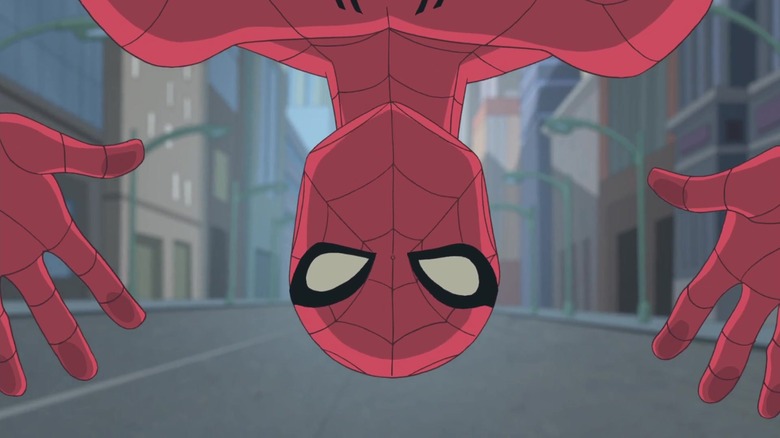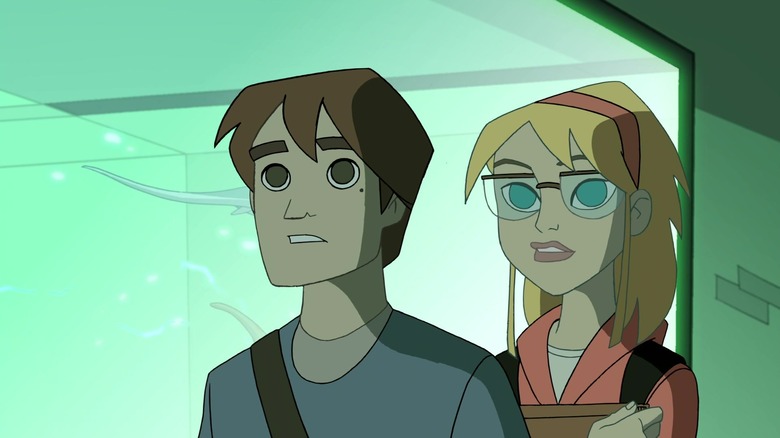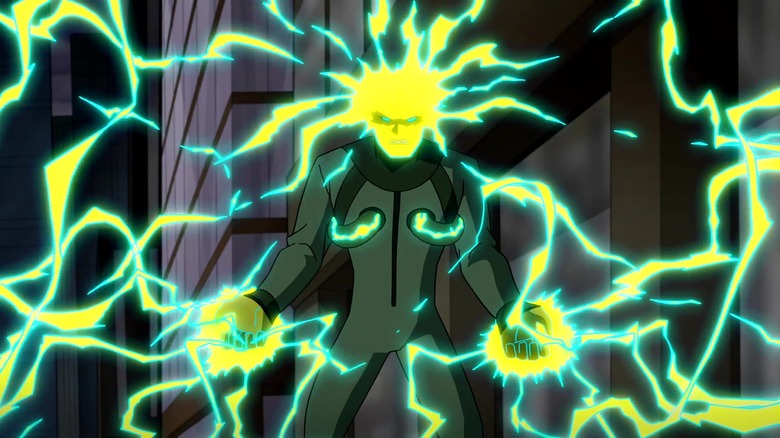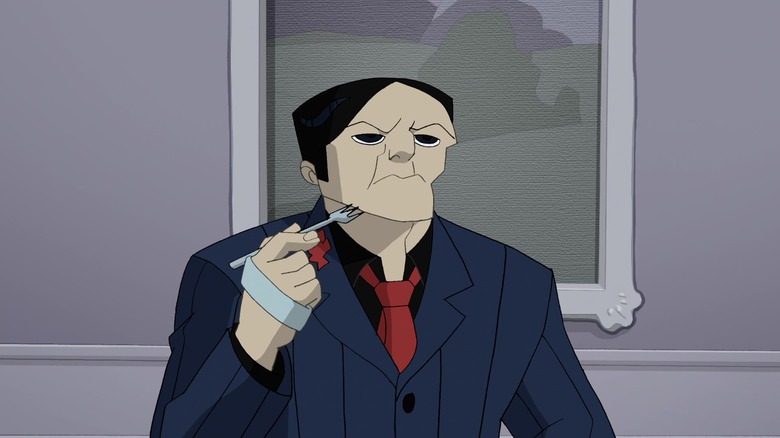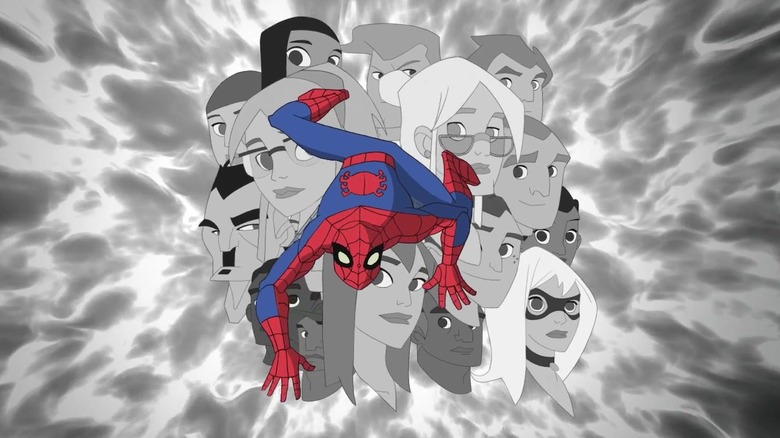Why Spectacular Spider-Man Was Canceled (Even Though It Was Spectacular)
Marvel's roster of animated series has never had the same cachet enjoyed by DC. "Batman: The Animated Series" set the standard for animated superhero shows produced in the United States. "Justice League: The Animated Series" cranked up the complexity in story and action. "Teen Titans" successfully integrated anime influence into its world, as did "The Batman." Not to mention "Batman: The Brave and the Bold," which embraces the absurdity of early comics to great effect. What can Marvel offer by comparison? "X-Men: The Animated Series" was ambitious in its attempts to adapt the tangled soap operatics of the comics. 1967's "Spider-Man" adaptation has some great moments of surreality, despite its famously low budget. Yet in 2022, both series can't help but come off as products of their time. "Batman: The Animated Series" was never just a product of its time; for folks like me, it was the definitive Batman. Thankfully, there is a more recent Marvel animated series worth seeking out.
Greg Weisman conceived the animated series "Spectacular Spider-Man" from the ground-up to be definitive. In an interview with IGN after the end of the show's first season, he describes what he calls the three C's: "coherent, cohesive and contemporary." The "Spectacular Spider-Man" series would unify hundreds of Spider-Comics into a satisfying whole. It would draw its cast from the whole history of the character while revising them as necessary for a modern audience. Then there's that fourth C, "classic." "Ultimate Spider-Man" had already found great success in the early 2000s by being a new, accessible version of Spider-Man. But that wasn't enough for Weisman. He wanted an iconic Spider-Man, one that combined the best elements of Raimi's blockbuster films with the best of Steve Ditko, Jack Kirby and John Romita Sr. The single most frustrating thing about "Spectacular Spider-Man” is that they could have pulled it off.
Fighting crime, spinning webs
"Spectacular Spider-Man" aired on Kids WB! in 2008, and it was co-produced by Weisman and Victor Cook at Culver Entertainment. Weisman needs no introduction, a television veteran who worked with Michael Reeves on the influential '90s animated series "Gargoyles." Cook had directed the animated film "Hellboy: Blood and Iron" in 2007, and hehad an animator's sensibility. "I wanted an action show with classic squash and stretch," he said in an interview with ENI News Zone. To make this happen, he reached out to Sean "Cheeks" Galloway, who had served as concept designer on "Hellboy: Blood and Iron." Galloway's designs for "Spectacular Spider-Man" are simple, but that is by design. After all, as Cook said, "Spider-Man is about speed and movement." Thanks to Galloway's designs and the careful supervision of Cook and his team, "Spectacular Spider-Man" became the most dynamic take on the character to that point in TV animation.
"Spectacular Spider-Man" was very well-received. It earned rapturous reviews from folks like Eric Goldman, who covered the series as it aired on IGN. It would go on to win a spot on the site's list of best comic book TV series in 2011, ranking above other animated classics like "The Tick." For Weisman, Cook and the rest of the team, the potential for their project seemed limitless. Just like with "Gargoyles," Weisman had ideas for many seasons of stories, taking Peter Parker from high school to adulthood. With enough fan response, even direct-to-DVD sequels tackling storylines from the comics that would never fly in an animated children's series were on the table. If "Spectacular Spider-Man" was given time to grow and evolve, it could have become a real competitor to DC's animated output. Unfortunately, through no fault of its own, "Spectacular Spider-Man" was doomed.
I want pictures of Spider-Man!
The premature end of "Spectacular Spider-Man" is frustrating because it had nothing to do with ratings, quality, or behind the scenes struggles. It was simply a matter of timing. When the first season aired in 2008, it had been announced that CW would be retiring Kids' WB. A Variety review of the first episode would note that "while Culver is currently producing a second season, precisely where those episodes will be seen remains up in the air." The staff at Culver Entertainment believed in "Spectacular Spider-Man," yet the series had found itself in No Man's Land before it had even aired. The series survived this setback, airing its second season in full on Disney XD. Then Disney bought Marvel, and the guillotine fell.
In 2012, Eric Goldman at IGN reported that Sony had relinquished all television rights to Spider-Man in return for some rights to the movies. This included all animated series, meaning that "Spectacular Spider-Man" had found itself in a bind. Goldman reached out to Weisman for comment, who responded, "Marvel can now produce the series, but of course, they don't have to." Goldman allows himself some optimism in his piece, noting the show's critical success, its popular toy line, and the clearly talented folks at the wheel. Surely, he asked himself, Marvel wouldn't get rid of the series just like that? Reader, they did. Marvel produced an all-new animated take, "Ultimate Spider-Man," which aired in 2012 and ran for over 100 episodes. But "Spectacular Spider-Man" was done and dusted.
With great power comes great responsibility
In a later blog post, Greg Weisman would break down the process by which "Spectacular Spider-Man" was jettisoned into limbo. As a production of Culver Entertainment, "Spectacular Spider-Man" had been made under the Sony umbrella. Sony had given Marvel the rights to make a Spider-Man animated series, while keeping the rights to their Spider-Man films. Unfortunately, while Sony could no longer produce animated series in the world of Spider-Man, the specific characteristics of "Spectacular Spider-Man" remained in their hands. Marvel could buy those characteristics for their own use, but why would they do something like that? "Spectacular Spider-Man" was very good, but it was not irreplaceable. So the series fell into a perpetual stalemate. Weisman insists that the show was not canceled, per se. It simply will never be continued.
For the future of "Spectacular Spider-Man," you have to look not at Weisman's future plans but at the careers of those who worked on the show. Jennifer Coyle, who directed several episodes of the series, is now a producer at DC after co-directing the "DC Super Hero Girls" web series from 2015. Victor Cook would continue his superhero work with "Stretch Armstrong and the Flex Fighters," but he has my heart and admiration for his contributions to the spectacularly geeky "Scooby Doo: Mystery Incorperated." Sean Galloway continues to sell illustrations, prints and zines at conventions and on his website. As for Weisman, he would go on to collaborate on another fan-favorite animated superhero series, "Young Justice." Once again, "Young Justice" was canceled after just two seasons. But unlike "Spectacular Spider-Man," "Young Justice” was unexpectedly renewed for a third season years later, with a fourth now in the pipeline.
'Nuff said
There's an apocryphal saying in the superhero comics industry that says, "Comics will break your heart." It happens in so many ways. Artists die early at their desks from heart attacks. Hollywood borrows full scenes from well-liked superhero comics without paying the original writers and artists a fair share. Even Stan Lee, revered by many as the creator of Marvel Comics while his collaborators Kirby and Ditko were ignored, spent the last few years of his life passed between scam artists and relatives like a football. By the standards of the comics industry, "Spectacular Spider-Man" had a good run. Great comics have run for less time before being crushed like insects. But something about the fate of "Spectacular Spider-Man" still stings. Intended to be a brave new beginning for the character on television, it instead marks a transitory phase between the successful animated superhero shows of the '90s and the Marvel Cinematic Universe's domination of pop culture. The show couldn't have been made at any other time, but that same quality made its continuation impossible.
It's enough to make you ask, why do writers and artists toil away making licensed superhero media at all? Why play with characters you don't own, when they might be taken from your hands at any time and given to somebody else? I can't say why anybody would choose to take that bargain. All I can say is that Weisman, Cook and company clearly loved what they were doing for the time they were allowed to do it. With "Spider-Man: Across the Spider-Verse" now bridging spider-universes from all sorts of comics, one can only hope that a certain Spectacular variant of our hero is out there somewhere. If not, there's always fanfiction.
